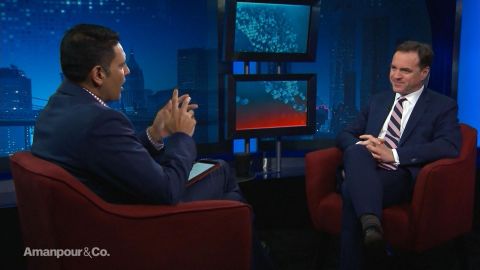Read Transcript EXPAND
JEFF DANIELS, ACTOR, “TO KILL A MOCKINGBIRD”: There’s no added value to just doing an A to Z of the book. I mean, put us in 24 folding chairs and we’ll read you the book or take Horton’s foot screenplay and put it on the stage. That’s not what we were supposed to do and we would have gotten slapped for that. So, what’s the added value of doing a play of “Mockingbird” now? And that’s what we’re chasing.
CHRISTIANE AMANPOUR: And for you — also, I would pause it that a trial scene is really exciting and it actually adds to the drama and you kept going back and forth, trial and then back story, and trial and then back inside and around, and I felt that kept it really, really exciting, even though you know the story, you are still waiting to see the verdict and the denouement, I thought that was really, really effective. In the book, Atticus is not really the main protagonist, it’s really Scout and to an extent, Jim, her brother and Dill, the friend. But in this play, you are much more of a protagonist and you have turned Atticus from, you know, a good, decent man sort of with all of the answers into somebody who’s actually questioning what’s happening. So, Atticus has changed a little bit, right?
AARON SORKIN, PLAYWRIGHT, “TO KILL A MOCKINGBIRD”: Yes. I mean, I think you just did an excellent job describing that change. In the book, you know, and movie, he may be the lead character but he’s not the protagonist in that — a protagonist has to change. A protagonist has to be put through something and changed by the end, and in the book that’s Scout. A protagonist also has to have a flaw. Scout’s flaw is that she’s young. And what changes is that she losses some of her innocence along the way. In the play, Scout and Jim and Dill, they remain protagonists but Atticus is the central protagonist. He had to change. He to have a flaw. And what he changes from to and what that flaw is seems to be landing with the audience.
AMANPOUR: Well, and the flaw is? How would you describe the flaw?
DANIELS: Of Atticus?
AMANPOUR: Yes.
DANIELS: An over belief in goodness in everyone. That eventually right will overcome wrong. That evil will be vanquished. Atticus, he’s got to start here and go to there. And when we started him, he’s a small-town lawyer who stays out of controversy. I handle land disputes, service agreements, foreclosures and can write wills.
AMANPOUR: And you get paid in vegetables?
DANIELS: And I get paid in vegetables sometimes when they don’t have cash. So, that’s who he is. And he sits on his porch, knows that the KKK is around, but he doesn’t get involved with that. He just does. He got to raise his two kids by himself, that’s what he’s doing. The judge comes over and said, “I got a criminal case. The lawyer we have is incompetent. You’re really needed because the guy is a hundred percent innocent. And if you don’t it the guy will go to prison for 18 years.”
About This Episode EXPAND
Over the past 20 years, Niall Ferguson has presented documentaries and written numerous historical tomes that chart the rise and fall of western empires. He sits down with Hari to talk about the rise of hate crimes in America, the US/China trade talks, and the current state of Brexit.
LEARN MORE


